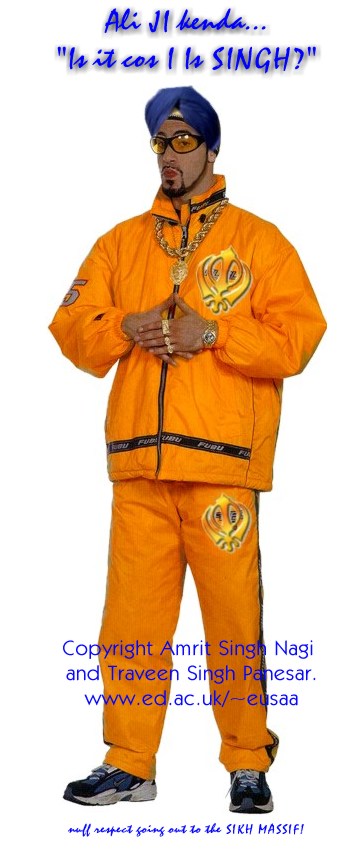 Dan Friedman
Dan FriedmanDespite frequent and misguided attempts in the media to simplify the character as 'white man plays stupid black man,' Baron Cohen's play with identity politics is far from straightforward. But it is still fair to ask whether Ali G might be part of the problem, rather than a satire on it. This has been a longstanding question of intelligent actors who take on potentially racist caricatures; consider Peter Sellers in the film The Party, a depiction of an Indian actor which may either be a bit of tasteless, racist humor, or an attempt to spoof the stereotypical treatment of Indian actors in British and American films. In the case of Ali G, the satire is more clear. Despite his desire to be Tupac, Snoop, or Biggy, Ali G is clearly not African American. He is not even black. Unlike Peter Sellers, Sacha Baron Cohen plays, without a trace of makeup, a character who is of indeterminate ethnicity but clearly wants to be black so much that he has totally convinced himself of it. The illusory nature of Ali G's blackness is foregrounded, and part of the joke. As we see week after week, Ali G cannot walk the walk of a gangsta. And, as is confirmed by the inclusion, at least in the English version of da Ali G Show, of an "authentic" DJ whose Jamaican patois Ali cannot understand -- Ali G cannot talk the talk either. Baron Cohen is not putting on a black persona; he is putting on a wannabe persona who crosses the "inviolable" lines of race without even noticing they are there.
What is remarkable is how these lines of fact and fantasy have been blurred even beyond Baron Cohen's intentions. First, because Baron Cohen is almost inscrutable as a performer, his ethnicity is so unclear that when he first became famous in England different nationalities and communities sought to claim him as their own. Greeks, Sikhs, Jews, Welsh, Indians, Scots, Bangladeshis, Pakistanis, even some black communities, all tried to claim him as theirs before his 'true' origins were made public.
Second, and similarly, the character of the 'real' wannabe (Alistair Graham, Ali Gupta, Alan Goldberg?) who projects the Ali G persona is even more elusive. So elusive, in fact, that many analyses of the show miss it altogether. This character is the radically indeterminate point of origin of the desire to be other than himself. Although the character has certain facts associated with it (a Nan, an Uncle Jamal, a house in Staines) he has a protean identity, shifting between all of the British ethnicities mentioned above, comfortable as all of them, settling on none. This indeterminacy is somewhat lost in the HBO show because for a US audience these differences flatten out and his constant self-alienation reads as exotic Britishness.



Zeek in Print
Buy your copy today
Germanophobia
Michael Shurkin
The Red-Green
Alliance
Dave Hyde
The Art of
Enlightenment
Jay Michaelson
yom kippur
Sara Seinberg
Josh Plays the Sitar
Josh Ring
Genuine Authentic
Gangsta Flava
dan friedman
saddies
David Stromberg
about zeek
archive
links